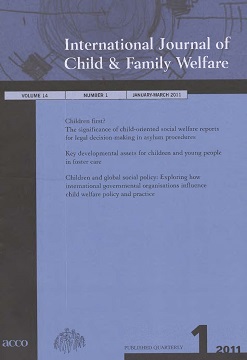Key Developmental Assets for Children and Young People in Foster Care
Keywords:
assets, development, foster careAbstract
Every child or young person placed in out-of-home care presents a unique set of opportunities and challenges for those seeking to make a difference in their lives. Targeting key developmental assets helps to nurture and reinforce the achievement of specific outcomes that equip looked after children and young people to become healthier, more emotionally and physically resilient young adults. This paper provides a conceptual rationale for targeting twenty developmental assets and adapting these for use with European and Commonwealth populations. A Key Developmental Assets (KDA) recording tool assists foster carers and supervising social workers to monitor, record and report on developmental outcomes achieved by each child or young person in their looked after care. Twelve key external assets wrapped around children and young people are monitored by foster carers from the first hour of placement. Eight key internal assets are nurtured and promoted by foster carers through a daily life approach to caring, with weekly recording of achievements.

